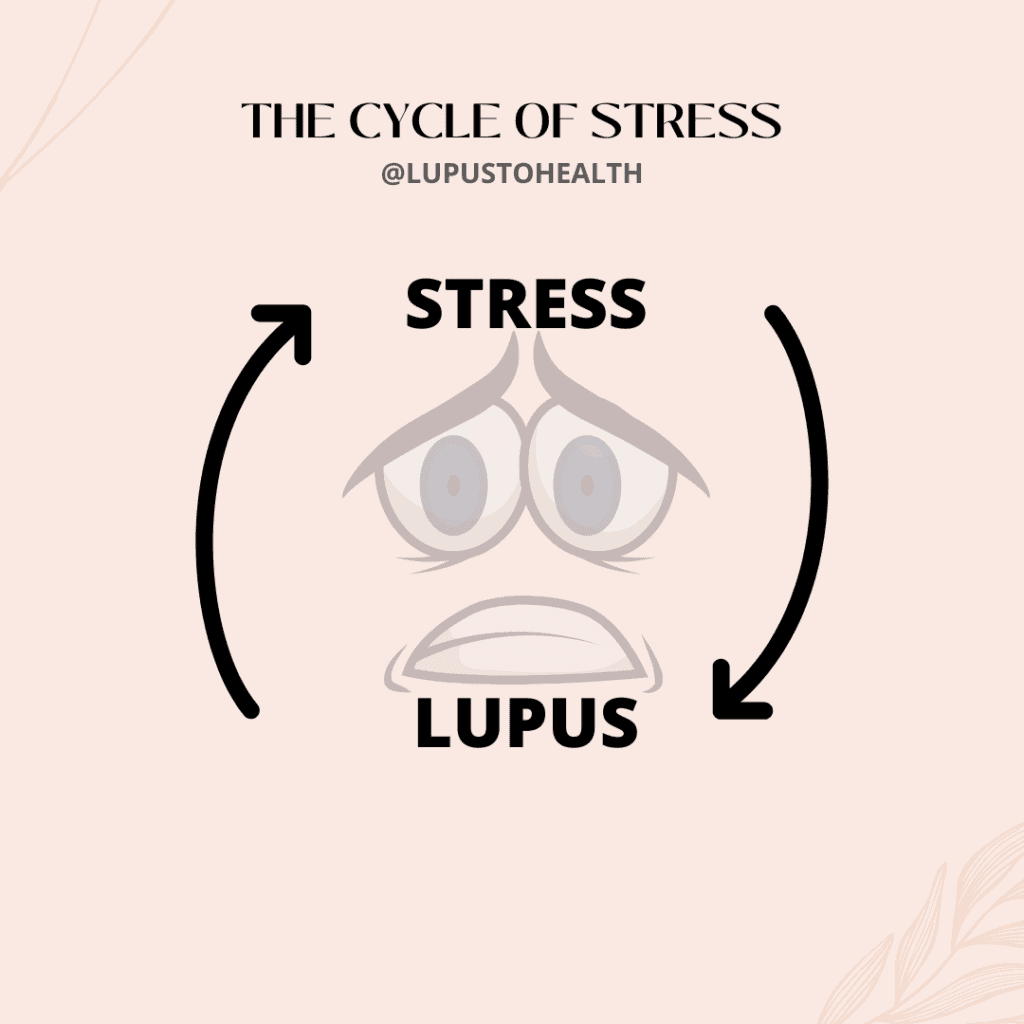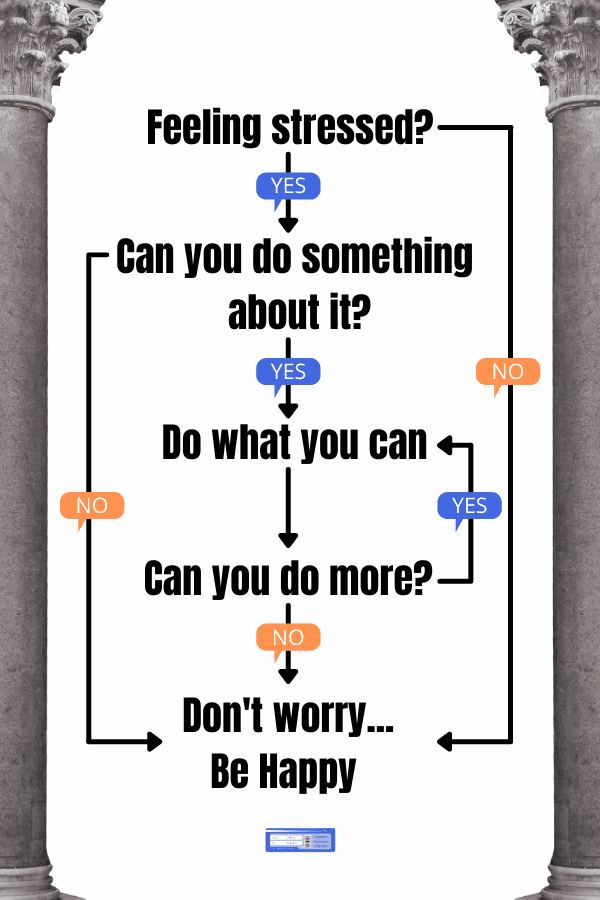Can stress cause lupus? Science suggests there is a strong link between stress-related disorders and autoimmune conditions. [1][2]
But now it seems that exposure to trauma appears to increase your risk of lupus. In fact, trauma may be a stronger predictor of developing lupus than smoking. [3]
Recent research shows a three-fold higher risk in those with probable PTSD. It was also shown that a two-fold odd increase occurs among those with past traumatic experience… in comparison to those who have never had such an experience. [3][4]
Thus, suggesting that a possible traumatic life event may be a trigger for lupus.
It is hard to get behind this on a personal level. But it does highlight the significance stress plays on lupus. As, by the looks of it, does a past traumatic experience. This is what we will cover in this article.
Can Stress Make Your Lupus Worse?
Like diet, stress is a lifestyle factor that plays a role in determining how healthy you are.
Life is full of stress. Stress is a part of life that we must all deal with. It comes in all shapes and sizes.
Even our thoughts can cause us stress and make the human body more susceptible to illness.
In fact, this is the basis of “German New Medicine”.
Stress affects everyone, young and old, rich and poor.
But, living with lupus brings added stress. Whether it is the feeling of being unwell, tired, or in pain. They add to the likes of work pressure, financial problems, family responsibilities, etc.
This creates a toxic cycle. In which stress feeds lupus and lupus fuels your stress.

Stress and Lupus
Stress appears to trigger systemic lupus and may worsen a patient’s condition. This also applies to and other autoimmune diseases. [5][6]
Chronic stress (low-intensity events repeated over time) is a big influence on making lupus patients worse. [6]
For example, a study shows chronic stress worsens symptoms of lupus the most. This was the case for 74% of the 58 participants. It was a 6-month research project. Yet, it only took 1 day of stress to affect 21% of the patients. [7]
The researchers do claim that stressful life events did not worsen the condition. Yet, two research papers state otherwise… claiming that PTSD may even trigger lupus. [3][4]

What is PTSD
PTSD is short for “Post-Traumatic Stress Disorder.”
It is a stress-related disorder. This is a group of psychiatric conditions that follow an identifiable trauma or other life stress. [8]
These events include:
- Experiencing the sudden death of a friend or loved one
- Receiving threats of or being the victim of a physical assault
- Being in a motor vehicle accident, or witnessing any severe accident
- Experiencing a life-threatening or disabling event affecting a loved one… or coping with a life-threatening illness
The person’s response to the event must involve intense fear, helplessness, or horror. This is why it is so much more common in war veterans.
In fact, a study on 666,268 Iraq war veterans showed PTSD to make a person twice more likely to develop an autoimmune disease. The risk even rose 51% in comparison to those with other psychiatric issues. [9]
Underlining PTSD and its potential pathway to autoimmune disorders.
How does stress affect your health and lupus?
Folk wisdom has long suggested that stressful events take a toll on health.
Stress can do many things to you in response to adverse events.
For instance, your central nervous system, endocrine system, and immune system are all connected. Stressors can dysregulate your body’s immune response by affecting the interplay of these systems. Regardless of whether the stress is from parachute jumping, bereavement, or academic exams.
Psychological stress is the outcome of when you perceive an event or environmental demand to exceed your ability to cope with it.
This is a broad definition. But it shows that it is not the stress, but how we react to the situation that matters.
Science suggests that stress will make you an easy target for ill health. In fact, a large meta-analysis shows stress alters your immune system. [10] Other studies show stress can: [11]
- Increase susceptibility to infectious agents
- Influence the severity of infectious disease
- Diminish the strength of immune responses to vaccines
- Reactivate latent herpesviruses
- Slow wound healing
How could PTSD cause Autoimmune Diseases?
PTSD itself has links to many metabolic and hormonal changes. Including those that could influence the development of an autoimmune disease.
These include lower “glucocorticoid” and higher “catecholamine” levels within the hypothalamic-pituitary-adrenal (HPA) axis. This is the part of the brain that controls your hormones. It directly affects the functions of the thyroid gland, the adrenal gland, and the gonads. [12]
Low levels of glucocorticoids and higher catecholamine levels stimulate pro-inflammatory proteins called “cytokines”. Causing an overproduction of cytokines; throwing your levels out of balance. Therefore, contributing to inflammation and disorders in your immune system. Putting you at risk of an autoimmune disorder. [13][14]
What’s more, cytokines are messenger molecules for many cells of the immune system. Studies show certain cytokines are higher in you if you have lupus. Some of which, like “IL-6”, appear to be greater in those with PTSD also. [15][16]
PTSD seems to alter DNA also, through the likes of DNA methylation. Altered DNA is a hallmark of immune cells in systemic lupus. [17][18]. Showing another potential pathway. Yet, there is a need for more research to know the true reason.

What Can We Do to De-stress?
Stress itself is not an illness, but rather a state. Long-term stress can cause serious health problems.
In short, a stressor stimulates your HPA axis and/or the sympathetic nervous system (SNS). The purpose of which is to help an organism adapt to deal with a threat.
This results in the release of pituitary and adrenal hormones. Or what we call “stress hormones.” This is what puts your body into the “fight or flight” mode.
The ‘fight or flight’ response consists of the rapid shift of energy to your heart, muscles, and brain. As well as the rapid transport of nutrients and oxygen to relevant tissues. Made possible by accelerated cardiac output and breathing rate, and increased blood pressure. In other words, it’s what makes your heart race and your mind clear.
Of course, this is important at times.
Short-term stress boosts the immune system in preparation for a challenge. But, if this state lasts too long it will cause wear and tear. Breaking you down in the end – especially if you have little control over the event. [10]
This is why it is important to nip the stress in the bud before as early as possible.
This is during the phase when you first feel the demand of whatever the stress is. By recognising this, you can change your perception before it triggers the stress response.
Here are 3 ways to lower your stress levels

#1. Exercise
Exercise can ease symptoms of anxiety, depression, and stress states. [19][20]
Exercise may make you calmer in as little as 20 to 30-minutes. [21] But regular exercise is best.
So, in short, physical stress is good. Mental stress is bad.
In terms of the best exercise choice, it appears there is no need to stress (pun intended). Both aerobic and strength training will help you reduce your stress levels. [22][23]
Some studies show exercising outdoors as a good option – running outside in particular. This is because nature can feel more relaxing than indoor gyms. But this may depend on you as a person. [20]
Still, Tai Chi, a form of Chinese low-impact mind-body exercise, is ideal for stress relief. It is an ancient Eastern practice that improves mental wellbeing. This includes reduced stress, anxiety, depression and mood disturbance, and increased self-esteem. [24] So, consider adding this to your week.
But in truth, any aerobic movement will help with stress management. This could include:
- Aerobics
- Brisk walking
- Cycling/ mountain biking
- Dancing
- Swimming
Any movement that gets you a little out of breath and sweaty really.
“Training gives us an outlet for suppressed energies created by stress and thus tones the spirit just as exercise conditions the body.”
– Arnold Schwarzenegger

#2. Put On Some Music
One way to manage stress in daily life is through listening to music. [25] On a personal level, music is a big part of life. Maybe its relaxing effect is the reason why.
Music may work through distraction and reappraisal. [26] Taking your mind away from the stress.
Classical music has a soothing effect. But go for your favourite choice of music – as long as it is positive and uplifting. It goes without saying, aggressive music like heavy metal is not the best option for relaxing. [27]
If heavy metal music or aggressive rap is your type of music, feel free to listen to them mid-exercise. But remember, negative music leads to negative feelings. [28]
It is also worth noting that music can help you relax before entering a stressful situation. Such as an invasive procedure like coronary angiography. [29] Showing music to be a side-effect free, none-invasive tool for relaxation.
“Music frees your soul from the dungeon of your mind”.
– Wiss Auguste

#3. Take a Stoic Approach to Life
Hans Selye, ‘the father of stress’ said…
“It’s not stress that kills us; it is our reaction to it.”
Stoics also believe that it is not what happens that matters, but how we react to it. It comes down to perception… so, stress is inevitable, but feeling stressed out is optional. It is part of life’s challenges.
Stoicism is a school of philosophy that hails from ancient Greece and Rome. In the early parts of the 3rd century, before Christ. It is a philosophy of life that:
- Maximises positive emotions
- Reduces negative emotions
- Helps individuals to hone their virtues of character
Its founder, Zeno, lost everything in a shipwreck. His successor Cleanthes arrived in Athens with empty pockets. Then Seneca was like many of us who have health problems but become an exile. Showing that this philosophy’s foundation is adversity.
One practice they promote is to separate the things you can control from the things you can’t. Stoics call this, “the dichotomy of control.” So, next time you’re stressing out, follow this practice.

This is one example of how stoics deal with stress. In support, Stoicism appears to improve the quality of life amongst muscular dystrophy patients. [30] As well as an effective treatment for distress disorders. [31]
However, science isn’t set on stoicism. Some researchers say Stoicism could make people mute their feelings or disconnect from others. Generating negative consequences for their mental health and wellbeing. [32]
– You can learn more on Stoicism by clicking here –
Final Thoughts
The critical issue with stress is its chronic effect over time.
There are, of course, many things that can cause stress. But, having a chronic illness like lupus is one of them. This is on top of the typical long-term stressors of daily life like:
- Daily hassles
- Frustration of traffic jams
- Work overload
- Financial difficulties
- Marital arguments
- Family problems
These situations can easily create a sense of guilt and resentment towards others. Or frustrate you enough to become bottled up anger.
Regardless, this pent-up anger we hold inside ourselves all produce the same effects on our body. Triggering your hypothalamus to release stress hormones and put you in a fight-or-flight mode.
Some amount of stress is good—it allows us to study for that important exam, remain awake to complete a research proposal, and can increase our focus.
Yet, when chronic stress goes unreleased, it suppresses the body’s immune system and may manifest as illness. Science is starting to suggest this includes lupus.
Hence, it is key to keep stress low for our health and wellbeing. You can achieve this through exercising, listening to music, and changing your perspective on life’s challenges.
In fact, stress management should be part of all autoimmune treatment plans.
Pingback: What Causes Lupus? (An up-to-date answer in 2021) -
Pingback: 7 Daily Habits for a Healthy Heart with Lupus -
Pingback: How To Take Control of Your Dry Skin with Lupus -
Pingback: Discover The Hidden Link You Need to Know Between Sleep and Lupus -